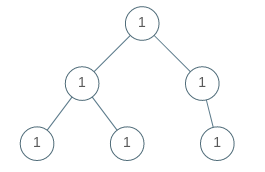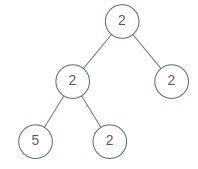A binary tree is univalued if every node in the tree has the same value.
Return true if and only if the given tree is univalued.
Example 1:
Input: [1,1,1,1,1,null,1] Output: true
Note:
- The number of nodes in the given tree will be in the range
[1, 100]. - Each node's value will be an integer in the range
[0, 99].
# Definition for a binary tree node.
# class TreeNode:
# def __init__(self, val=0, left=None, right=None):
# self.val = val
# self.left = left
# self.right = right
class Solution:
def isUnivalTree(self, root: TreeNode) -> bool:
def dfs(root):
if root is None:
return True
if root.val != self.val:
return False
return dfs(root.left) and dfs(root.right)
self.val = root.val
return dfs(root)/**
* Definition for a binary tree node.
* public class TreeNode {
* int val;
* TreeNode left;
* TreeNode right;
* TreeNode() {}
* TreeNode(int val) { this.val = val; }
* TreeNode(int val, TreeNode left, TreeNode right) {
* this.val = val;
* this.left = left;
* this.right = right;
* }
* }
*/
class Solution {
private int val;
public boolean isUnivalTree(TreeNode root) {
val = root.val;
return dfs(root);
}
private boolean dfs(TreeNode root) {
if (root == null) {
return true;
}
if (root.val != val) {
return false;
}
return dfs(root.left) && dfs(root.right);
}
}/**
* Definition for a binary tree node.
* struct TreeNode {
* int val;
* TreeNode *left;
* TreeNode *right;
* TreeNode() : val(0), left(nullptr), right(nullptr) {}
* TreeNode(int x) : val(x), left(nullptr), right(nullptr) {}
* TreeNode(int x, TreeNode *left, TreeNode *right) : val(x), left(left), right(right) {}
* };
*/
class Solution {
public:
int val;
bool isUnivalTree(TreeNode* root) {
val = root->val;
return dfs(root);
}
bool dfs(TreeNode* root) {
if (root == nullptr) return true;
if (root->val != val) return false;
return dfs(root->left) && dfs(root->right);
}
};/**
* Definition for a binary tree node.
* type TreeNode struct {
* Val int
* Left *TreeNode
* Right *TreeNode
* }
*/
func isUnivalTree(root *TreeNode) bool {
return dfs(root, root.Val)
}
func dfs(root *TreeNode, val int) bool {
if root == nil {
return true
}
if root.Val != val {
return false
}
return dfs(root.Left, val) && dfs(root.Right, val)
}

